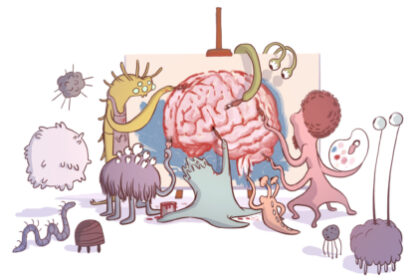For years, these stimulating medications have been hailed as a lifeline for those grappling with attention deficit hyperactivity disorder (ADHD), allowing them to regain control over their daily lives. However, a groundbreaking study conducted by Harvard scientists has sent shock waves through the medical community, revealing a potential dark side to these widely prescribed drugs.
Contrary to conventional wisdom, the research suggests a link between the prolonged use of ADHD medications and an elevated risk of developing long-term psychosis and other mental illnesses. This unexpected revelation prompts a fundamental reevaluation of the risks and benefits associated with these drugs, demanding a deeper understanding of the intricate interplay between neurochemistry, mental health, and the long-term consequences of pharmacological interventions.
In this article, we delve into the findings of the study, explore the potential mechanisms behind this unsettling connection, and consider the implications for both medical professionals and the countless individuals who rely on ADHD medications for improved cognitive function.
Understanding the Link: ADHD Medications and the Risk of Psychosis
Psychosis Unveiled:
Psychosis, often striking for the first time during the late teenage years or early adulthood, is a complex mental state characterized by a detachment from reality. Those affected might experience delusions, wherein they hold steadfast to false or irrational beliefs, or hallucinations, perceiving sights or sounds that do not exist. Psychosis, although often associated with illnesses like schizophrenia, is itself a symptom, indicative of an underlying issue rather than a standalone ailment.
The ADHD Paradox:
In the realm of mental health, Attention Deficit Hyperactivity Disorder (ADHD) stands as a recognized challenge, marked by behavioral manifestations including inattention, hyperactivity, and impulsivity. While more prevalent in males during childhood, the gender divide tends to equalize by adulthood. A neurodevelopmental disorder, ADHD is typically diagnosed before the age of 12 and affects a substantial number of American children, with a reported 6.1 million diagnoses in 2016.
A Startling Connection: ADHD Medications and Psychosis:
However, the latest research emanating from Harvard has cast a spotlight on an unexpected facet of the ADHD narrative. Rather than ADHD itself being a harbinger of psychosis, emerging evidence points toward a potential link between prolonged use of specific medications, namely stimulants such as methylphenidate and amphetamine, and an elevated risk of psychosis. This revelation raises disconcerting questions about the balance between the benefits of ADHD management and the potential hazards lurking within the medications designed to alleviate its symptoms.
The Vital Role of Education:
Too often, children and their parents are unaware of the potential side effects that accompany prescribed ADHD medications. A well-intentioned prescription from a doctor might offer a solution for managing ADHD, yet the risk of psychosis might be left undisclosed. Instances like a 17-year-old student who sought increased focus through higher medication dosages, only to confront hallucinations, serve as cautionary tales. The lack of awareness until symptoms escalate underlines the necessity of informed decision-making and comprehensive education for both medical practitioners and patients.
Navigating ADHD Medications Thoughtfully:
When confronted with an ADHD diagnosis, the importance of meticulous consideration cannot be overstated. A proper diagnosis should involve a comprehensive evaluation by a team of specialists well-versed in ADHD standards, rather than hastily relying on a brief pediatrician’s assessment. Parents serve as their child’s advocates, demanding the proper testing to underpin any diagnosis.
If stimulants are deemed the chosen course of action, embracing a role of education and awareness is paramount. Comprehensive knowledge about the ADHD medication in question becomes an invaluable tool in mitigating potential risks while aiming to harness the medication’s intended benefits.
In the ever-evolving landscape of mental health management, the connection uncovered by Harvard’s pioneering research underscores the need for a nuanced approach to ADHD treatment. As we navigate the delicate balance between therapeutic interventions and unforeseen consequences, prioritizing education, thorough assessment, and informed decisions stands as our best defense against the potential shadows lurking beneath the surface of ADHD medications.
Confronting a Complex Reality: Navigating ADHD Medications and Beyond
The discovery of a potential link between ADHD medications and an increased risk of psychosis adds a layer of complexity to the landscape of mental health treatment. As we grapple with the implications of this newfound connection, it becomes abundantly clear that an informed and cautious approach to managing ADHD is essential. The world of pharmacology, while offering solutions, demands a deeper understanding of potential consequences – both anticipated and unforeseen.
Parents, caregivers, and medical professionals alike are urged to recognize the pivotal role of education in this narrative. Awareness about the potential risks of specific ADHD medications, combined with a comprehensive grasp of each individual’s unique physiology, can enable more thoughtful and well-informed decisions. An approach that prioritizes comprehensive assessment, informed consent, and ongoing monitoring can serve as a safeguard against the unanticipated ramifications of medication usage.
Beyond pharmaceutical interventions, there exists a realm of alternative strategies that warrant exploration. In the quest to tame the effects of ADHD, incorporating specific supplements into one’s diet could hold promise.
Here is a list of supplements to add to you or your child’s regimen when dealing with ADHD:
- Polyphenols – Freeze-dried strawberries are one of the richest sources of healthful polyphenols in the human diet. I recommend Organic Freeze-Dried Strawberries!
- Vitamin C – I recommend a whole food organic vitamin C supplement. This is the one that I take. Click here to get 15% off.
- Zinc – I recommend guava zinc from Omica Organics. Click here to visit Omica Organics and use the discount code: HealthyWildFree to get 10% off your order.
- Getting pasture raised beef in your diet is a great way to get Iron in your diet.
- Magnesium Is Great For Emotional Regulation, Click here to get the best magnesium supplement that I’ve found. Use the discount code: healthywildfree to get a discount.
- Omega-3/Omega-6 Fats Are Great At Enhancing Focus & Memory, I take fish roe from Paleovalley.com. Click here to get 15% off this Omega fat supplement.
- Best for improving attention span: L-theanine which is in cacao, or dark chocolate.
In conclusion, the convergence of ADHD management and the risk of psychosis demands a multifaceted approach. It compels us to reevaluate the paradigms governing mental health treatment, urging us to combine the powers of education, assessment, and caution.
As we tread the path toward holistic well-being, the future lies in a delicate equilibrium – one that acknowledges the benefits of modern medicine while embracing the potential of natural alternatives. In this quest, knowledge truly becomes the most potent tool at our disposal, guiding us toward a future where mental health treatment is a tapestry woven with care, insight, and the unwavering dedication to the wellness of all.




